ZQUIP is revolutionizing the way commercial job sites operate by introducing smart, efficient, and modular power solutions. At the forefront of their innovative vision is battery-swap technology, making it easier than ever to switch from diesel power to electric seamlessly on job sites.
Last year, MOOG Construction’s energy division, ZQUIP, made waves in the industry by introducing the cordless power tool battery model to heavy industrial equipment. The 700V ZQUIP Energy Modules are the key component of this innovation, offering interchangeability across all converted machines regardless of size, type, or manufacturer. This level of serviceability, runtime, and value surpasses current battery solutions.
At the recent bauma equipment show in Munich, Germany, ZQUIP showcased their latest development, enabling job sites to effortlessly transition from diesel to electric power and vice versa on the same machine during operations. This flexibility allows for optimal utilization of energy resources, ensuring every kilowatt counts.
The concept of swappable batteries is a game-changer for job sites where machines often sit idle for extended periods. By adopting this technology, sites can efficiently allocate energy to various tools as needed without the constraint of dedicated batteries for each machine. Additionally, a 140 kW diesel generator built into a compact package offers a reliable power source for continuous operation when quick battery recharges are not feasible.
A demo video featuring CASE-based electric excavators operating on ZQUIP’s Energy Modules illustrates the seamless battery swapping process. With a swift two-minute battery exchange, downtime is minimized, and operations can resume promptly. This innovative approach eliminates the need to remove the entire machine for charging or maintenance, streamlining workflow efficiency.
ZQUIP’s HDEV battery swap technology showcases the simplicity and effectiveness of their modular power solutions. By prioritizing ease of use and versatility, ZQUIP is setting a new standard in the construction equipment industry.
In conclusion, ZQUIP’s dedication to advancing power solutions for commercial job sites is evident in their cutting-edge battery-swap technology. With a focus on convenience, efficiency, and sustainability, ZQUIP is paving the way for a more streamlined and eco-friendly future in construction operations. The world is constantly changing and evolving, and with that change comes new technologies, innovations, and advancements that shape the way we live our lives. From the invention of the wheel to the development of the internet, humans have always been on a quest to improve and enhance our way of life.
One of the most exciting and promising advancements in recent years has been the rise of artificial intelligence (AI). AI refers to the development of computer systems that can perform tasks that normally require human intelligence, such as visual perception, speech recognition, decision-making, and language translation.
The potential applications of AI are vast and varied, with the technology already being integrated into various industries such as healthcare, finance, transportation, and entertainment. In healthcare, AI is being used to analyze medical images, predict patient outcomes, and provide personalized treatment recommendations. In finance, AI is being used to detect fraud, optimize trading strategies, and improve customer service. In transportation, AI is being used to develop autonomous vehicles that can navigate roads safely and efficiently.
But with all of these advancements comes the question of ethics and responsibility. As AI becomes more advanced and integrated into our daily lives, it is important to consider the implications of relying on machines to make decisions for us. There are concerns about bias in AI algorithms, data privacy and security, and the potential for job displacement as automation becomes more prevalent.
Despite these concerns, the potential benefits of AI are undeniable. The technology has the power to revolutionize industries, improve efficiency, and enhance our quality of life. As we continue to develop and refine AI technologies, it is crucial that we do so in a responsible and ethical manner, ensuring that the benefits of AI are shared equitably and that the technology is used for the greater good.
In conclusion, artificial intelligence is a powerful and transformative technology that has the potential to shape the future of our society. As we navigate the challenges and opportunities that AI presents, it is important to approach the technology with caution and foresight, ensuring that it is developed and deployed in a way that benefits all of humanity. Only then can we truly harness the full potential of AI and create a brighter future for generations to come.







